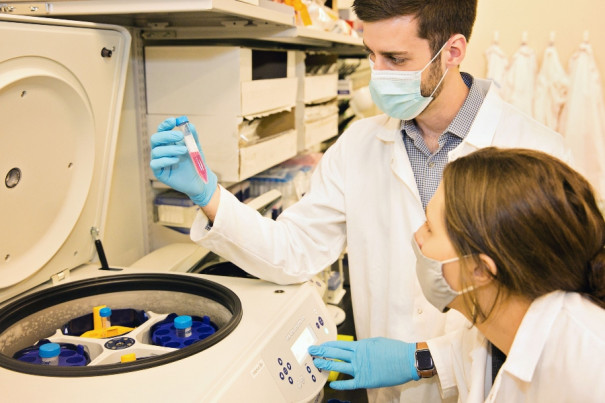NextUp: The Philly Biotech Company Developing an In Vivo Approach to CAR T-Cell Therapy
Interius BioTherapeutics just raised $76 million in seed funding to advance their clinical testing.

Photograph courtesy Interius BioTherapeutics
“NextUp” is a weekly NextHealth PHL feature that highlights the local leaders, organizations and research shaping the Greater Philadelphia region’s life sciences ecosystem. Email ccunningham@phillymag.com with pitches for NextUp.
Who: In 2016, Saar Gill, a lead physician-scientist at the University of Pennsylvania’s Center for Cellular Immunotherapies, started Carisma Therapeutics. The company, which is still in operation today, focuses on engineering white blood cells to kill cancer through chimeric antigen receptor (CAR) macrophage immunotherapy. But when it came to CAR T-cell therapy — a process that involves removing a patients’ T cells, modifying them to fight cancer, and then returning them to the body — Gill wondered if there was a way T cells could be empowered to kill cancer without removing them from body. This desire to find an in vivo approach to CAR T catalyzed Gill and local biotech expert Bruce Peacock to get to work, co-founding Interius BioTherapeutics in 2019.
What: Interius BioTherapeutics is a Philadelphia-based preclinical stage biotechnology company initially focused on treating hematologic malignancies by leveraging its novel gene delivery platform to generate CAR T cells directly in vivo. Interius’s CEO Phil Johnson says their commitment to in vivo is where the company name comes from, as it is a reminder that their therapeutic delivery is done internally (the “interior” of the body), rather than outside of a patient’s body.
When: Since its founding, Interius has been working on creating a data set for their gene delivery platform in order to show that Gill’s technology is successful in an animal model. Once this was demonstrated in mice, Interius put together a pitch deck to generate funding from investment groups, which culminated this past month when Interius raised $76 million in Series A financing. This, Johnson says, will allow Interius to advance their gene delivery platform and enable highly specific, durable re-engineering of cells right where they live in the human body.
What it means: According to Interius, their therapeutic in vivo approach bypasses the need for ex vivo cell manipulations and the potentially toxic pre-conditioning chemotherapy required for standard CAR T-cell treatments. In other words, Interius is simplifying the approach to CAR T therapy. “The current CAR T model can take two to three weeks, but patients continue to need medical care within that interim,” Johnson says. “Interius’s technology would allow patients to be treated immediately in a clinical setting without any downtime, making therapy more swift and accessible.”
Why it matters now: In addition to their in vivo platform, Johnson says Interius is developing applications beyond immuno-oncology that address diseases not amenable to current gene therapy modalities. “With the types of work we’re doing to engineer vectors, we will be able to target any cell in the body for re-engineering,” Johnson says. This will allow treatment to expand beyond the realm of cancer and target a broader range of patients.
Looking ahead, Johnson says Interius will file an Investigational New Drug (IND) application with the FDA likely in 2023. With that, Interius will be able to test their in vivo approach in human patients.


